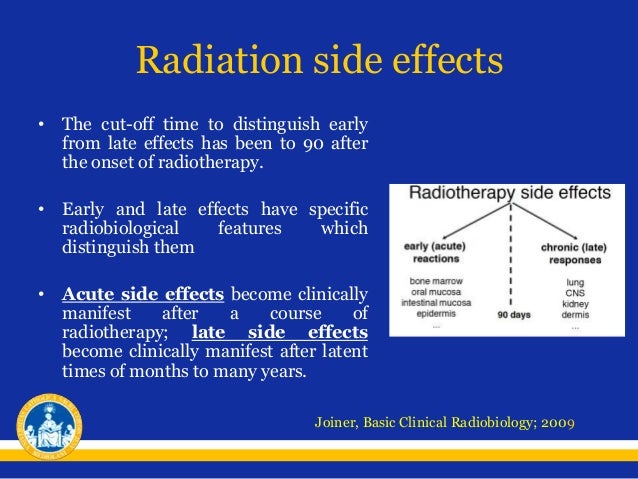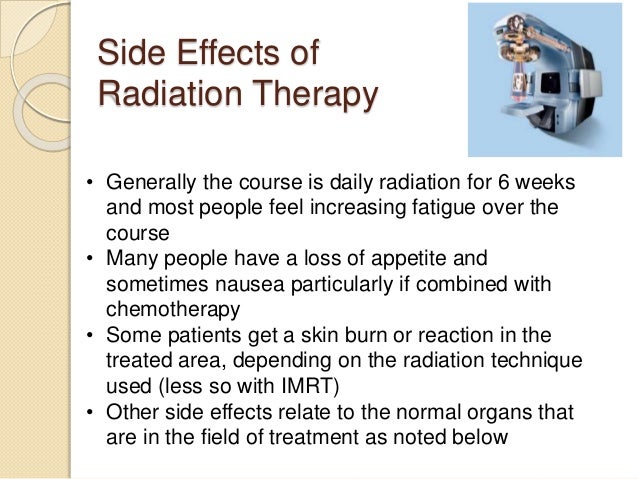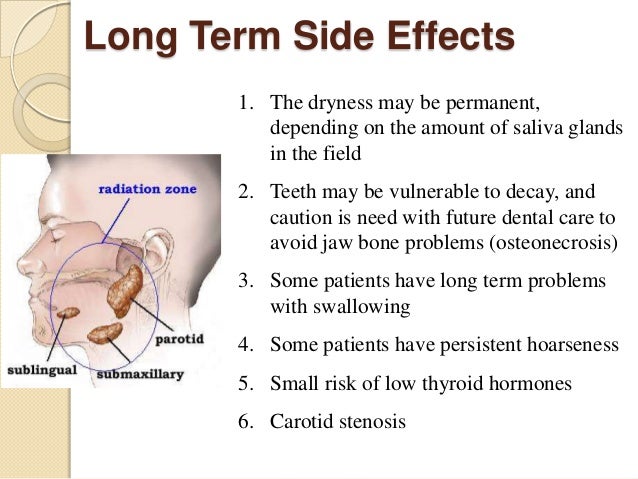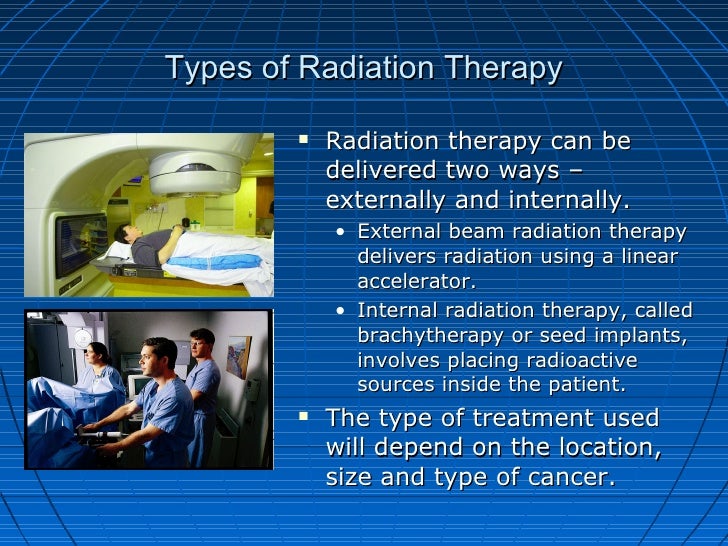Radiotherapy causes side effects because it affects healthy tissue as well as cancer cells. Healthy tissue is better able to recover than cancer cells, but may be damaged by the radiation in the short or long term. Although most side effects are temporary, some may be permanent and some can appear months or even years after treatment finishes.
Immediate side effects
Immediate side effects may also be called early or acute side effects. They occur during treatment and up to six months after treatment has finished.Skin reactions
Everyone who has external beam radiotherapy is at risk of skin damage during or after treatment.The extent of the skin reaction will depend on a number of factors, including:
- the dose of radiotherapy given
- the duration of treatment
- where on the body it’s given – for example the skin folds of the breast, or the armpit
- your skin type
- any existing skin conditions you may have (such as eczema)
- your age
- if you’re overweight
- if you smoke
- if you’re having chemotherapy at the same time.
- The skin may become pinker or darker over time.
- The skin may feel tender, dry, itchy and sore.
- The skin may peel or flake as treatment goes on.
- Sometimes the skin can become red or sore, and may blister or become moist and weepy.
Skincare
It’s important to look after your skin during treatment. This will help prevent infection, reduce pain and help keep the area being treated comfortable.Usually you’ll be given specific skincare instructions by the radiotherapy team. Most radiotherapy centres advise the following.
- Wash the treated area gently with warm water, using a mild and gentle soap. Pat the skin dry with a soft towel.
- Have a shower rather than a bath.
- Use a non-perfumed deodorant.
- Use a mild and gentle moisturiser to keep the skin soft.
- If you want to use anything else on the skin in the treatment area, discuss this with your therapeutic radiographer first.
- Avoid exposing the treated area to extremes of temperature such as hot water bottles, heat pads, saunas or ice packs during treatment.
- Avoid exposing the treated area to sun while having radiotherapy and afterwards until any skin reaction has settled down. Use a sunscreen with a high sun protection factor (SPF). Apply it even under clothes too as it’s possible to get sunburnt through some clothing.
- You may want to avoid swimming during treatment and shortly afterwards (until any skin reactions have healed), as a wet swimsuit can rub the skin and cause discomfort. Also the chemicals in a swimming pool can make the skin dry and irritated. Talk to your specialist or therapeutic radiographer if you normally swim regularly and want to continue.
- Because friction or rubbing can cause or worsen skin reactions, wearing a soft cotton bra or vest may be more comfortable. You’re usually advised not to wear an underwired bra until your skin heals. Alternatively, you may prefer to go without a bra. If you’ve had your breast removed (a mastectomy) and have been wearing a silicone prosthesis, you may find it more comfortable to wear the soft, lightweight prosthesis (softie or cumfie) you used straight after surgery.
Swelling (oedema) of the breast
During treatment your breast or chest area may appear swollen and feel uncomfortable.This usually settles within a few weeks after treatment. If it continues after this time, talk to your oncologist or breast care nurse as you may need to be seen and assessed by a lymphoedema specialist.
Pain in the breast or chest area
Now and then you may have aches, twinges or sharp pains in the breast/chest area.Although these are usually mild, they can continue for months or even years, but they usually become milder and less frequent over time.
You may also experience stiffness and discomfort around the shoulder and breast/chest area during and after treatment.
Continuing to do arm and shoulder exercises during your radiotherapy and for several months afterwards may help minimise or prevent any stiffness or discomfort.
Hair loss in the armpit or chest area
Radiotherapy to the armpit will make the underarm hair fall out on that side. Men also experience hair loss in the area of the chest that’s being treated. Hair usually starts to fall out two to three weeks after treatment has started and it may take several months to grow back. For some people, hair lost from radiotherapy may not grow back at all.Sore throat
If you have treatment to the area around your collarbone, you may develop a sore throat or discomfort when swallowing, during or after your treatment. If this happens, talk to your radiographer, specialist or breast care nurse. It may help to take some simple pain relief in liquid form, particularly before eating, until the discomfort improves.Tiredness and fatigue
Generally, radiotherapy to the breast doesn’t make people feel unwell, but you may feel very tired during or after your treatment.Travelling to and from hospital can be tiring in itself. However, many people still manage their daily tasks as usual and some continue to go to work throughout their treatment.
Fatigue is extreme tiredness and exhaustion that doesn’t go away with rest or sleep and may affect you physically and emotionally. This is a very common side effect of cancer treatment. It may start or become worse after radiotherapy has finished. If you’ve also had chemotherapy, you may already have fatigue by the time you start radiotherapy.
Everyone’s experience of fatigue is different. It’s important to know what your limits are and not to expect too much of yourself.
Lymphoedema
Lymphoedema is swelling of the arm, hand or breast/chest area caused by a build-up of lymph fluid in the surface tissues of the body. It can occur as a result of damage to the lymphatic system, for example because of surgery and/or radiotherapy to the lymph nodes under the arm (axilla) and surrounding area.Lymphoedema is a long-term condition, which means that once it has developed it can be controlled but is unlikely to ever go away completely. If the arm, hand or breast/chest area on the side of the radiotherapy or surgery swells or feels uncomfortable and heavy, contact your breast care nurse or GP.
Change in breast shape, size and colour
If you’ve had radiotherapy after breast-conserving surgery (wide local excision or lumpectomy), the breast tissue on the treated side may feel firmer, or the breast may be smaller and look different to before. This is because the breast is not a regular shape and it’s not possible to get an even dose of radiotherapy over the whole area being treated.This is normal but if you’re concerned about differences in the size of your breasts, or if the difference is noticeable when you’re dressed, discuss this with your breast surgeon or breast care nurse.
Late side effects
Some side effects can develop months or even years after the end of radiotherapy. However, improvements with the equipment and accuracy in marking the exact areas to be treated have made many of these side effects much less common.Serious side effects are very rare and experts agree that the benefits of treatment in reducing the chance of breast cancer returning outweigh the risk of possible side effects.
Radiotherapy to the breast and/or under the arm can cause hardening of the tissue. This is known as fibrosis and is caused by a build-up of scar tissue. If the fibrosis becomes severe, the breast can become noticeably smaller as well as firmer. This is rare but may happen several months or years after radiotherapy has finished.
Under the skin, you may also see tiny broken blood vessels, known as telangiectasia. This is permanent and there’s no treatment for it.
Tenderness can occur over the ribs during treatment. In some people, this may continue but usually improves gradually over time.
Sometimes after treatment to the breast/chest area, part of the lung behind the treatment area can become inflamed, causing a dry cough or shortness of breath. This usually heals by itself over time. More rarely, fibrosis of the upper lung can occur, causing similar side effects.
Although particular care is taken to avoid unnecessary radiotherapy to the tissues of the heart, if radiotherapy is given on the left side you may be at risk of heart problems in future.
Other side effects that can occur later include:
- weakening of the bones in the treated area, which can lead to rib and collarbone fractures
- damage to the nerves in the arm on the treated side, which may cause tingling, numbness, pain, weakness and possibly some loss of movement.

Radiotherapy side effects:-
early (acute) reactions
bone marrow, oral mucosa, intestinal mucosa. epidermis.
------- 90 days
chronic (late) responses
lung, CNS ( The central nervous system (CNS) controls most functions of the body and mind. It consists of two parts: the brain and the spinal cord. The brain is the center of our thoughts, the interpreter of our external environment, and the origin of control over body movement. ), kidney, dermis.








No comments:
Post a Comment